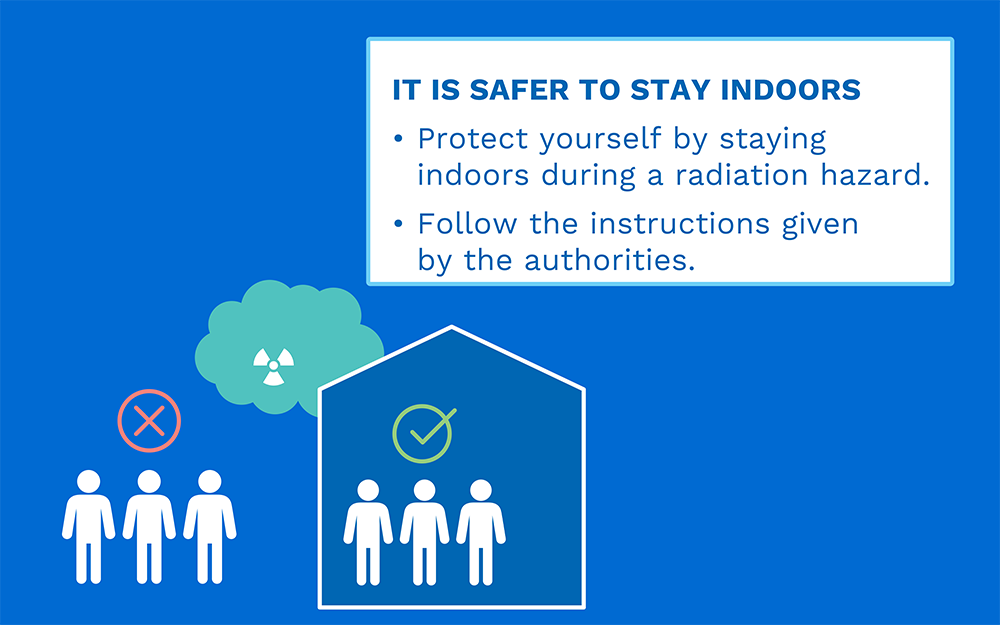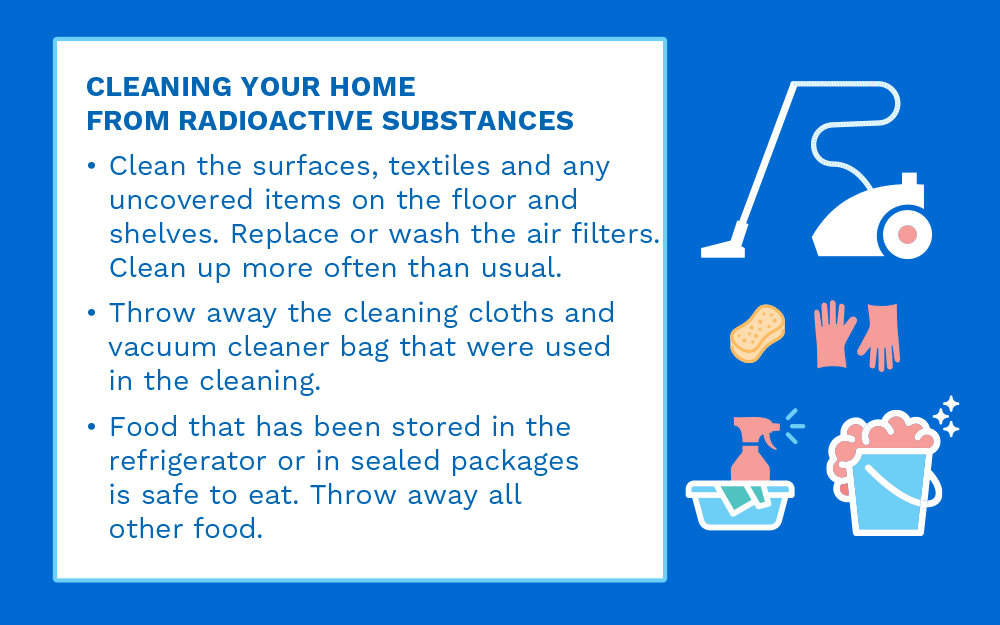Instructions for members of the public
If the situation requires immediate protection, people are warned with a general emergency signal, which is a continuous acoustic signal, ascending and descending. In addition, the public will be warned by means of an emergency warning, for example, on the radio, TV and the 112 Suomi mobile phone app. If you hear the general emergency signal, you must go inside and follow the instructions of the emergency warnings.

Protective measures in a radiation hazard situation
- Get indoors when you hear the general emergency signal or other instructions to take cover indoors.
- Move pets indoors. Farm animals are also moved indoors, and their feed and drinking water must be well protected.
- Shut off the ventilation. Close and tape the doors, windows and air vents. Block all other vents, such as flues, cooker hoods and mail slots.
- Stay in the middle part of the building or in the basement, which offer the best protection. Avoid rooms with large windows.
- Follow the instructions given by the authorities on the radio, TV or Internet. Please make sure that any information you share comes from a reliable source. Follow especially the communications of your regional Emergency Services Department. The Emergency Services Department will decide on the protective measures.
- Avoid using the telephone, to prevent overloading the telephone lines. This way, you can secure the authorities’ communications.
- Only take the iodine tablet when advised by the authorities, and follow the dosage instructions. If you do not have iodine tablets, do not go outside to buy them.
- Keep food in tight containers or sealed plastic bags. It is safe to use food in the refrigerator, freezer and closed boxes, and to drink tap water.
- Remove carpets, curtains and other textiles, for example, by storing them in a closet. Use a bedsheet, for example, to protect objects and furniture that are difficult to clean. This will make subsequent cleaning easier.
- If you must go outside, wear protective clothing that covers as much of your skin as possible – waterproofs, rubber boots, rubber gloves and goggles. Wear a respiratory filter or a piece of cloth or a wad of paper towel to safeguard your breathing. When you come back in, remove your clothes in the hall or entrance to your home and clean them, for example, by rinsing, and wash yourself carefully in the shower.
- Do not leave the area unless instructed to do so by the authorities, so that you will not endanger yourself on the way.
What to do when the air outdoors no longer contains radioactive substances
- Follow the instructions given by the authorities on required cleaning measures and restrictions on the use of foodstuffs after the radiation hazard situation.
- Ventilate the indoor areas and wipe the surfaces.
People can reduce radiation exposure themselves
In contaminated areas, people can reduce their exposure themselves at homes and in workplaces. Special attention should be paid to homes, as well as day care centres, schools and other facilities where children and young people spend time. The authorities will announce the areas where the measures are needed.
- Simple ventilation and cleaning of indoor premises, such as vacuum cleaning, wiping and washing, reduce the radiation dose considerably. If the indoor areas are not cleaned, radioactive substances may find their way from the contaminated surfaces into your body. During the cleaning, protective clothing is worn as necessary, as is a respiratory filter in dusty work. The premises should be re-cleaned, as people and pets carry radioactive substances indoors.
- Washing removes radioactive substances from the skin and hair and reduces the amount entering the body. It is especially important to remember to wash your hands carefully and repeatedly.
- You can reduce exposure and re-contamination of the indoor premises by leaving outdoor clothes and shoes in the hall or entrance when coming inside and washing yourself, as well as changing your clothes. Pets should also be washed when returning from outdoors, if possible, since they carry radioactive substances in their legs and fur.
- After a radioactive plume passes, premises in which the ventilation was on or which have natural ventilation should have their air filters changed or washed as quickly as possible. This prevents the detachment and migration of radioactive substances from the filters indoors.
- Cleaning the outer surfaces of yards and buildings reduces exposure in the living environment. Protective clothing and a respiratory filter must be worn during this work.
- Restrictions on the processing or use of natural produce and self-produced foodstuffs reduce exposure from food.
- Personal means of transport, tools and objects outside should be cleaned. They should be re-cleaned if they are used in contaminated areas.
Cleaning the home from radioactive substances
Once the radioactive plume has left the area, ventilation and cleaning indoors begins as soon as possible. Ventilation and cleaning are important, as radioactive substances seep in while the radioactive plume is passing. If indoor areas are not cleaned, radioactive substances may find their way from the contaminated surfaces into your body.
The radiation dose can be reduced considerably through simple cleaning measures, such as wiping with a damp cloth, washing surfaces and vacuum cleaning. Dusty work methods should be avoided. Premises to be cleaned first are those where people spend long periods of time, such as apartments, day care centres, schools and hospitals, or where there are a lot of people, such as workplaces and shopping centres. The premises should be re-cleaned regularly, since people carry radioactive substances indoors.
Air filters should be changed or washed as quickly as possible in premises where the ventilation was on while the radioactive plume passed. This prevents the detachment and migration of radioactive substances from the filters indoors.
- Clean the surfaces, textiles, and any uncovered items on the floor and shelves. Replace or wash the air filters.
- Clean up more often than usual.
- Throw away the cleaning cloths and vacuum cleaner bag that were used in the cleaning.
- Food that has been stored in the refrigerator or in sealed packages is safe to eat. Throw away all other food.
